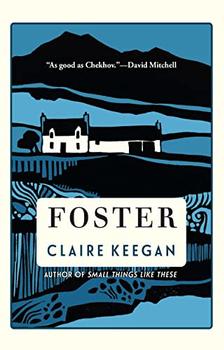Summary | Excerpt | Reviews | Beyond the Book | Read-Alikes | Genres & Themes | Author Bio

This article relates to Foster
 Claire Keegan is a writer’s writer — lauded by the likes of William Trevor, who chose her first short story collection, Antarctica (1999), for the William Trevor Prize; Hilary Mantel, who gave her second short story collection, Walk the Blue Fields (2007), the Edge Hill Short Story Prize; and Richard Ford, who awarded Foster the Davy Byrnes Irish Writing Award in 2009. Now, nearly 25 years into her career, her work is also finding the popular audience that it deserves. Small Things Like These was shortlisted for the Booker Prize and the Rathbones Folio Prize. It also won the Orwell Prize for Political Fiction for tackling the open secret of the Catholic Church’s Magdalene Laundries, where, even as late as 1985, when Keegan’s novella is set, unwed mothers were sent to give birth and other outcast girls were kept out of sight.
Claire Keegan is a writer’s writer — lauded by the likes of William Trevor, who chose her first short story collection, Antarctica (1999), for the William Trevor Prize; Hilary Mantel, who gave her second short story collection, Walk the Blue Fields (2007), the Edge Hill Short Story Prize; and Richard Ford, who awarded Foster the Davy Byrnes Irish Writing Award in 2009. Now, nearly 25 years into her career, her work is also finding the popular audience that it deserves. Small Things Like These was shortlisted for the Booker Prize and the Rathbones Folio Prize. It also won the Orwell Prize for Political Fiction for tackling the open secret of the Catholic Church’s Magdalene Laundries, where, even as late as 1985, when Keegan’s novella is set, unwed mothers were sent to give birth and other outcast girls were kept out of sight.
Foster is now in print for the first time in the United States, having had an unusual path to publication. It first appeared in the New Yorker in 2010, but in abridged form. Keegan told the Guardian she felt the condensed version “was very well done but wasn’t the whole story. It had some of the layers taken out, but I think the heart was the same.” She herself has described Foster as a long short story; “It is definitely not a novella. It doesn’t have the pace of a novella.” Faber & Faber first published it in 2010 as a standalone volume in the UK, where it is considered a modern Irish classic. A 2022 Irish-language film version of Foster, called The Quiet Girl (which names the main character Cait) became a favorite on the international film festival circuit.
Keegan was born in 1968 and brought up as part of a large Catholic family on a farm in County Wicklow, in the east of Ireland, south of Dublin. After attending college in New Orleans, she returned to rural Ireland, where she has spent the last 30 years teaching, leading creative writing workshops and producing short fiction. With an 11-year gap between Foster and Small Things Like These, Keegan’s publication rate is certainly not high. However, she is respected for her carefully honed prose.
Within the confines of a short story or novella, every word must contribute to rendering a character or advancing the central plot. In his judge’s comments on Foster, Richard Ford wrote, “It tells a conceivably simple story … [Keegan] brings a thrilling synaesthetic instinct for the unexpected right word and exhibits patient attention to life’s vast consequence and finality. She knows when to linger and never does so without profit, and indeed is never timid about saying more when less would be less.”
For those who are harried, distracted or burned out, short stories or novellas can be a perfect way to ease back into the reading habit. And if that sounds like you, you could do much worse than pick up one of Claire Keegan’s gems.
Filed under Books and Authors
![]() This article relates to Foster.
It first ran in the November 16, 2022
issue of BookBrowse Recommends.
This article relates to Foster.
It first ran in the November 16, 2022
issue of BookBrowse Recommends.
Talent hits a target no one else can hit; Genius hits a target no one else can see.
Click Here to find out who said this, as well as discovering other famous literary quotes!
Your guide toexceptional books
BookBrowse seeks out and recommends the best in contemporary fiction and nonfiction—books that not only engage and entertain but also deepen our understanding of ourselves and the world around us.